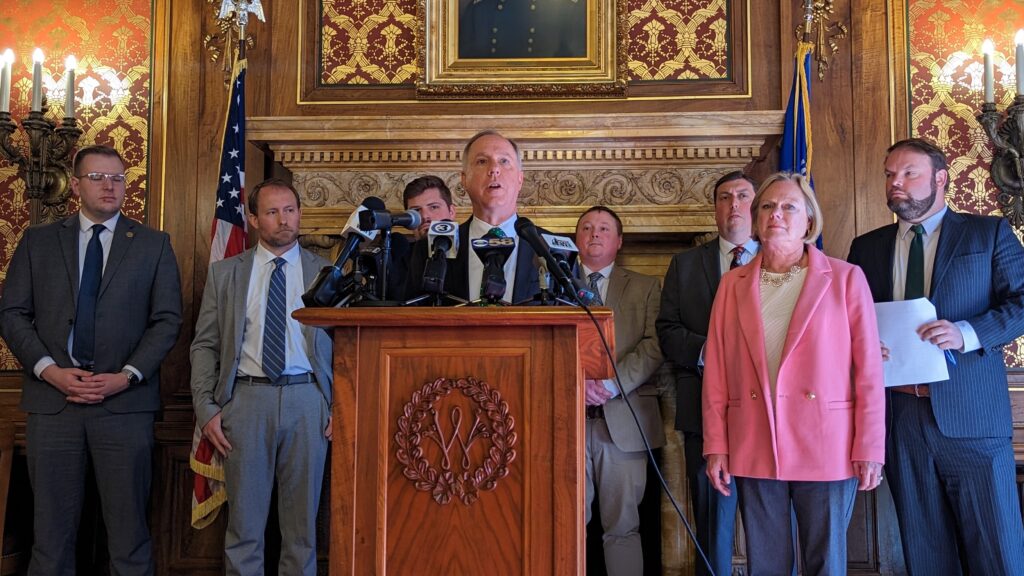Assembly Passes School Crime, Conversion Therapy Bills
Bill provides no funding for school resource officers. Democrats oppose both bills.

Assembly Speaker Robin Vos discusses Tuesday’s floor session at a press conference. Photo by Baylor Spears/Wisconsin Examiner.
The Wisconsin Assembly passed two school crime bills and retained a rule change that restores the discredited practice of using conversion therapy to try to change LGBTQ people’s sexual orientation or gender identity during a Tuesday floor session.
Republican lawmakers passed a pair of bills that would require schools to report data on crimes and, if the number of incidents reaches a certain threshold, to hire school resource officers. The first bill, Assembly Bill 53, passed 61-35 and would require public and private high schools to report data on crimes and incidents that occur on their property.
“This is a tool that parents deserve and that community members deserve so they can find out what’s going on and see how safe their kids are at school,” Rep. Cindi Duchow (R-Town of Delafield) said during a press conference before the session. She cited recent incidents in Wauwatosa, where the school board is reviewing discipline policies in response to several school fights, as evidence for why the bill is needed.
Democrats criticized the bill, saying it wouldn’t contribute to helping keep kids safe in school. Rep. Deb Andraca (D-Whitefish Bay) said the bill was profoundly disappointing and parents wouldn’t benefit. She said lawmakers should instead be looking at different programs to stop crime before it happens, rather than sending “unfunded busy work” to already understaffed schools.
“We are looking backwards in time to see what already has happened,” Andraca said. “What we should be looking at is ways to keep our schools safe in the first place, and that is not what this bill does.”
Andraca said the Legislature should instead consider implementing comprehensive student threat assessment guidelines, which are meant to intervene at the earliest warning signs to stop school violence before it happens.
Dave Considine (D-Baraboo) said the data won’t help keep school districts safe and that data that the bill requires schools to report already exists. “It’s going to mirror what the police reports in that district already show you,” Considine said. “We don’t need this.”
“This is not a school safety bill,” Duchow said during floor debate. “This is a school transparency bill.”
The second school crime bill passed 59-36 with Scott Johnson (R-Jefferson) joining Democrats against. Assembly Bill 69 requires that if 100 incidents occur during a semester and at least 25 of those incidents result in an arrest, a school must employ an armed school resource officer by the following school year.
Ron Tusler (R-Harrison) said the bill was a partial solution to the problem of increasing crime in Wisconsin schools. He said the bill would help by allowing the state to send SRO’s into problem areas.
“If you want to stop crime from happening at school, bring an officer to that building,” Tusler said during debate. “I had one when I was in high school. As an officer, she got to know the kids. She knew the ones that might commit a crime and the ones that were just pranksters.”
Nik Rettinger (R-Mukwonago), the bill’s author, said during a press conference before the session that the bill would likely have the biggest impact on Milwaukee and Madison school districts. The two districts, the largest in the state, removed SROs from their schools in 2020, though Milwaukee Mayor Cavalier Johnson has signaled that police officers could potentially return to MPS sometime this year.
“It’s common sense,” Rettinger said. “We’ve seen the use of school resource officers who provide protection for students and faculties alike and that is absolutely a priority going forward, especially now with the escalating violence we’ve seen since students have returned to the classroom.”
Democrats argued that the Legislature shouldn’t be telling school districts what to do, and that SROs wouldn’t necessarily help with the problem of crime in schools. “If your school districts can make their own decisions, why can’t mine?” LaKeshia Myers (D-Milwaukee) asked during floor debate.
Myers questioned why schools couldn’t put money — that would potentially go to hiring SROs — into different programs if that’s what they thought was the best.
“When you talk about having a school resource officer in the building that would stop things from happening — not necessarily.” Myers said. “It’s a reactive practice, if you think about it. The fight is already taking place.”
Rep. Ryan Clancy (D-Milwaukee) and Rep. Darrin Madison, Jr. (D-Milwaukee) said the bill will likely disproportionately impact students of color and reinforce the school-to-prison pipeline.
“Students, teachers, and parents have made it abundantly clear that in order to create safe and thriving school communities we must invest in mental health services, teacher funding, healthy school meals, early intervention programs, and more,” the lawmakers said in a joint statement. “Instead, Assembly Republicans have passed AB 53 and AB 69 which will reinforce the school-to-prison pipeline by requiring that certain incidents, not just crimes, be reported to law enforcement and requiring certain schools to employ armed school resources officers.”
Other Democrats took issue with the financial obligation on schools the bill requires.
For schools that begin employing an SRO, the bill would require that the Department of Public Instruction reimburse school boards or the operator of an independent charter school and that the governor would need to allocate federal American Rescue Plan Act (ARPA) money to reimburse DPI for those payments.
According to a fiscal estimate by the Department of Administration, there are no ARPA funds available for the specified allocations that the bill requires.
Assembly Speaker Robin Vos (R-Rochester) said the Legislature will look into that.
Both bills now go to the Senate for consideration.
Assembly refers JCRAR suspension bills
Lawmakers voted to send three suspension bills from the Joint Committee for the Review of Administrative Rules (JCRAR) to committee.
Assembly lawmakers voted 61-35 to send another bill to the Committee on Family Law. The bill suspends a rule implemented by the Marriage and Family Therapy, Professional Counseling, and Social Work Examining Board that prohibited the practice of conversion therapy — a discredited form of therapy that involves trying to convince LGBTQ people to change their sexual orientation and/or gender identity — by licensed counselors, therapists and social workers.
Democrats urged lawmakers to take a vote on the bill on Tuesday, rather than send the bill back to committee.
“Allowing conversion therapy in Wisconsin does not make our communities more safe and it does not help our kids succeed. This issue is personal for me as a member of the LGBT community,” Rep. Greta Neubauer (D-Racine) said during floor debate. “It’s personal for my family as I have a transgender younger sister, and it’s personal for my community, where I know many LGBTQ young people who truly struggle to make it through the day knowing the threats that they face now.”
“I know we don’t agree on a lot in this building,” Neubauer continued. “But I have to tell you that I’m just so disappointed that we cannot agree to ban a policy that directly increases the risk of depression and suicide in children.”
Republicans, as they did last session, plan to leave the bill in committee to avoid a potential veto by Gov. Tony Evers, which would allow the rules to go back into effect. “That’s the process, but that’s just how you hold up the rule,” Vos said during a press conference.
The Assembly voted without objection to send a second JCRAR bill that suspends an emergency rule that was implemented by the Wisconsin Election Commission in July 2022 to the Committee on Campaigns and Elections. The rule identified what constitutes a complete address for purposes of a statutory provision that prohibits the counting of an absentee ballot whose certificate is missing the address of a witness and required municipal clerks to take corrective actions to remedy missing or inaccurate information.
Finally, the Assembly referred a JCRAR bill to the Tourist Committee. The bill suspends rules by the Department of Agriculture, Trade and Consumer Protection that regulate pools located at short-term rentals.
Assembly finally recognizes Black History Month
Assembly lawmakers passed a resolution, endorsed by the Legislative Black Caucus, that proclaims February 2023 as Black History Month.
“It is a long time coming, but this little resolution, even though it is the month of March, still speaks through that Black history is American history, not just in February, but in every single month and every day,” said Rep. Dora Drake (D-Milwaukee).
The resolution recognizes seven Black Wisconsinites for their work including Paul Higginbotham, the first African-American judge to serve on the Wisconsin Court of Appeals, Elisterine Clayton, a 100-year-old Milwaukee resident who helped build the historic Halyard Park community and Marcia Anderson, first African-American woman to become a major general.
The bipartisan resolution follows several years of controversy. In 2019, Republicans objected to the resolution that included Colin Kaepernick, the former NFL player known for taking a knee to protest police violence. Last year, the Legislature passed a resolution introduced by Sen. Julian Bradley, Wisconsin’s only Black Republican lawmaker, without support from the Black caucus. That resolution didn’t include names of any individuals.
“This resolution is nothing more than honoring the good, the bad and the ugly that’s happened for African Americans here in the state of Wisconsin and honoring those that have made headway in our state,” Drake said.
Assembly lawmakers pass school crime bills, uphold conversion therapy was originally published by the Wisconsin Examiner.






















Republicans claim they are for smaller government and against the “nanny state.” However, when it comes to controlling the lives and behaviors of others, they are the nanny state. In fact, they see no reason to even consider the informed opinions of experts, especially when experts contradict Republican reactionary ideology.
Who’s the hayseed in the gray suit standing to the left of Vos’s podium with his thumbs in his pockets like an indignant sixth grader? I thought the Republican charm school was supposed to file off those rough edges from their woodtick politicians.